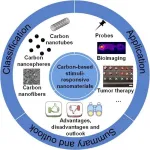Real-world data suggests stopping immunotherapy after two years is reasonable in patients with advanced lung cancer
Penn Medicine study finds indefinite immunotherapy is not associated with improved survival in large, retrospective cohort
2023-06-04
(Press-News.org) CHICAGO – Over the past decade, the approval of immune checkpoint inhibitors has revolutionized treatment for patients with advanced lung cancer, helping many live longer lives and improving overall survival for the disease. However, an important question has remained unanswered: How long should a patient with advanced non-small cell lung cancer (NSCLC), who receives immunotherapy as part of their initial treatment, continue with treatment?
A new retrospective cohort study, published today in JAMA Oncology and presented at the 2023 American Society of Clinical Oncology (ASCO) Annual Meeting (Abstract 9101) by researchers from Penn Medicine’s Abramson Cancer Center, suggests that it’s reasonable to stop immunotherapy treatment at two years as long as their cancer hasn’t progressed. The researchers found no statistically significant difference in overall survival between patients who stopped treatment at two years and those who continued treatment indefinitely.
“We hope this data provides reassurance that stopping treatment at two years is a valid treatment strategy that does not seem to compromise overall survival,” said lead author Lova Sun, MD, an assistant professor of Hematology-Oncology at the Perelman School of Medicine at University of Pennsylvania. “In the absence of definitive prospective data about the duration of therapy – which will take years to accumulate – our goal was to use real-world observational data to provide guidance on this important clinical question.”
The appropriate length of treatment remains an open question because pivotal clinical trials have used different treatment durations, and as therapies have been approved and become widely available, many patients have continued therapy beyond the one to two years tested in clinical trials. The longer a patient continues treatment, the higher the health care costs become – both to the patient and to the health care system – and there is ongoing risk of immune-related side effects.
In this study, the researchers analyzed de-identified data from a national electronic health record that included patients with advanced NSCLC who were treated in both academic and community settings. Of the 1,091 patients who received an immune checkpoint inhibitor as part of their initial therapy (either alone or in combination with chemotherapy) and whose cancer had not continued to grow, only one in five stopped immunotherapy at two years and were considered the “fixed duration” group for this analysis. The vast majority who continued treatment beyond two years were considered the “indefinite duration” group.
The team analyzed the data and found similar overall survival probabilities between the two groups: 79% for fixed duration and 81% for indefinite duration.
“Ultimately, the field is still on the leading edge of determining the most appropriate duration for these immunotherapies that have been so effective for patients with advanced lung cancer,” said senior author Charu Aggarwal, MD, MPH, the Leslye M. Heisler Associate Professor for Lung Cancer Excellence in Hematology-Oncology at Penn. “This study provides important data that we hope will help patients feel less worried about potential risks of coming off therapy and more confident if they decide to discontinue treatment after two years.”
Sun will share the results in a poster session on Sunday, June 4, at 8 a.m. CT in Hall A.
###
Penn Medicine is one of the world’s leading academic medical centers, dedicated to the related missions of medical education, biomedical research, and excellence in patient care. Penn Medicine consists of the Raymond and Ruth Perelman School of Medicine at the University of Pennsylvania (founded in 1765 as the nation’s first medical school) and the University of Pennsylvania Health System, which together form a $9.9 billion enterprise.
The Perelman School of Medicine is consistently among the nation's top recipients of funding from the National Institutes of Health, with $546 million awarded in the 2021 fiscal year.
The University of Pennsylvania Health System’s patient care facilities include: the Hospital of the University of Pennsylvania and Penn Presbyterian Medical Center—which are recognized as one of the nation’s top “Honor Roll” hospitals by U.S. News & World Report—Chester County Hospital; Lancaster General Health; Penn Medicine Princeton Health; and Pennsylvania Hospital, the nation’s first hospital, founded in 1751. Additional facilities and enterprises include Good Shepherd Penn Partners, Penn Medicine at Home, Lancaster Behavioral Health Hospital, and Princeton House Behavioral Health, among others.
Penn Medicine is powered by a talented and dedicated workforce of more than 47,000 people. The organization also has alliances with top community health systems across both Southeastern Pennsylvania and Southern New Jersey, creating more options for patients no matter where they live.
Penn Medicine is committed to improving lives and health through a variety of community-based programs and activities. In fiscal year 2021, Penn Medicine provided more than $619 million to benefit our community.
END
ELSE PRESS RELEASES FROM THIS DATE:
2023-06-04
About The Study: The findings of this study provide reassurance that for patients with advanced non–small cell lung cancer whose disease is still responding to immune checkpoint inhibitor therapy at two years, stopping therapy and monitoring rather than continuing immunotherapy indefinitely is a reasonable strategy with sustained clinical benefit.
Authors: Lova Sun, M.D., M.S.C.E., of the Perelman School of Medicine at the University of Pennsylvania in Philadelphia, is the corresponding author.
To access the embargoed study: Visit our For The Media website at this link https://media.jamanetwork.com/
(doi:10.1001/jamaoncol.2023.1891)
Editor’s ...
2023-06-03
Presented today by VHIO’s Ana Oaknin at the 2023 ASCO Annual Meeting, 2-6 June (Chicago, IL), updated dose expansion data of the STRO-002-GM1 global phase I study* show promise of FolRα-targeting antibody drug conjugate (ADC) luveltamab tazevibulin in patients with recurrent FolRα-expressing epithelial ovarian cancer.
80% of patients included in this study presented with FolRα expression levels higher than 25%. The overall response rate among these patients was 43.8% in the dose expansion cohort, with a median duration of response ...
2023-06-03
Carbon-based stimuli-responsive nanomaterials are gaining much attention due to their versatility, including disease diagnosis and treatment. They work under endogenous (pH, temperature, enzyme, and redox) or exogenous (temperature, light, magnetic field, ultrasound) stimuli. Carbon-based stimuli-responsive nanomaterials can be used as smart materials with dynamically tunable physicochemical properties in response to changes in internal or external environmental stimuli. Their diverse combinations of nanostructures and molecular designs, as well as functional ...
2023-06-03
ABSTRACT: 4008
CHICAGO ― HER2-targeted bispecific antibody zanidatamab demonstrated durable responses in patients with treatment-refractory HER2-positive biliary tract cancer (BTC), researchers from The University of Texas MD Anderson Cancer Center reported at the 2023 American Society of Clinical Oncology (ASCO) Annual Meeting. The study results also were published today in The Lancet Oncology.
In the first cohort of the global Phase II HERIZON-BTC-01 trial, which included 80 patients with HER2-positive tumors, the confirmed objective response rate (cORR) was 41% with a median duration of response (DOR) of 12.9 months at a median follow-up of 12.4 months. ...
2023-06-03
Survival rate beyond 10 years in children with drug-resistant epilepsy (DRE) was highest after cranial epilepsy surgery and lowest when treated only with antiseizure medications, according to a study published in The Lancet Child and Adolescent Health. This large, retrospective study was the first to compare long-term survival in children with DRE among cohorts treated with medications only, vagus nerve stimulation plus medications, and cranial epilepsy surgery plus medications. Results show that risk of early death was reduced by over 80 percent after surgery and by 40 percent after ...
2023-06-03
When one thinks of movie reviews, one might see them as harbingers of success or failure at the box office. Some researchers have previously found that both positive and negative reviews correlate to box office revenues, and the effect of negative reviews diminishes over time.
However, researchers at the University of California, Davis, suggest that is not the case.
Researchers analyzed pre-release commentary and opening weekend box office revenue, turning the impact of movie reviews on its head and revealing an unexpected harbinger of failure phenomenon in the movie industry.
The study, ...
2023-06-03
Bile duct cancers are uncommon and aggressive types of gastrointestinal cancer. They include cholangiocarcinomas, which can form inside or outside of the liver, as well as cancers of the gallbladder, and are highly likely to cause serious disease or prove fatal.
Bile duct cancers affect the biliary tract, which consists of organs and ducts that make and store bile and release it into the small intestine. They are known as “silent” cancers, because there are usually no symptoms until they reach later stages. Surgery can be effective if bile duct cancer is caught early, ...
2023-06-02
June 2, 2023
Contact:
Emily Gowdey-Backus, 978-934-3369 or Emily_GowdeyBackus@uml.edu
Nancy Cicco, 978-934-4944 or Nancy_Cicco@uml.edu
Startups to unveil cutting-edge point-of-care technologies at Boston medtech event
Medtech and life sciences entrepreneurs and investors forging the future of health care will come together Tuesday, June 6, to showcase pioneering technologies and grow the region’s medtech ecosystem.
The 2023 Point of Care Showcase and Pitch Event will be a free, in-person program beginning at 2 p.m. at Mintz, 1 Financial Center, 40th Floor, Boston, to introduce ...
2023-06-02
A team of researchers from EPFL have found a way to use the phenomenon of strong gravitational lensing to determine with precision – about 3 times more precise than any other technique – the mass of a galaxy containing a quasar, as well as their evolution in cosmic time. Knowing the mass of quasar host galaxies provides insight into the evolution of galaxies in the early universe, for building scenarios of galaxy formation and black hole development. The results are published in Nature ...
2023-06-02
BOSTON – Various medications can be prescribed to lower blood sugar levels in individuals at high risk for developing type 2 diabetes, but it’s often unclear which patients will benefit most from which drugs.
In a study published in Diabetologia, investigators at Massachusetts General Hospital (MGH), founding member of Mass General Brigham (MGB), identified genetic variants associated with response to two such drugs: metformin and glipizide. The findings may help personalize ...
LAST 30 PRESS RELEASES:
[Press-News.org] Real-world data suggests stopping immunotherapy after two years is reasonable in patients with advanced lung cancer
Penn Medicine study finds indefinite immunotherapy is not associated with improved survival in large, retrospective cohort





